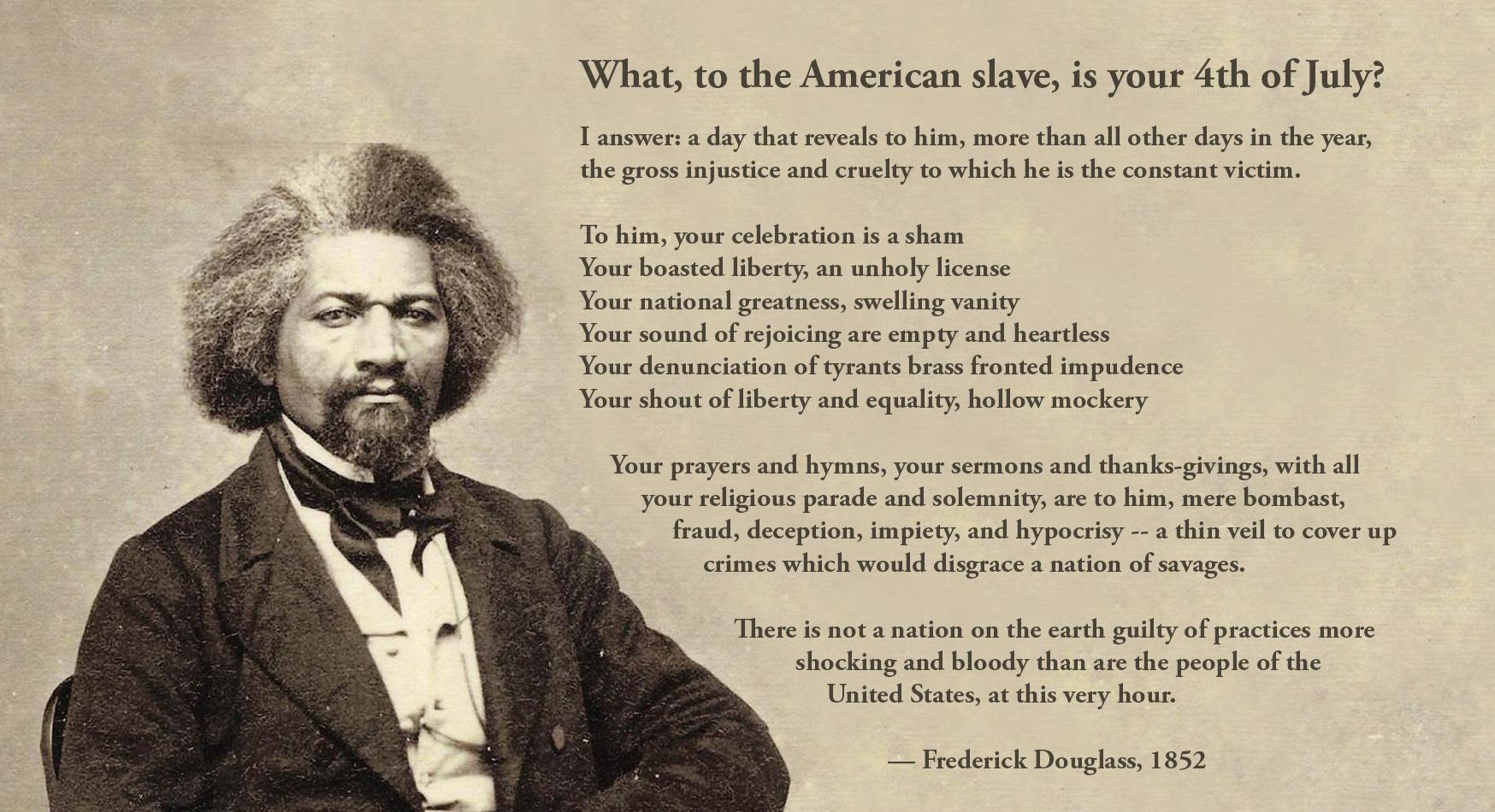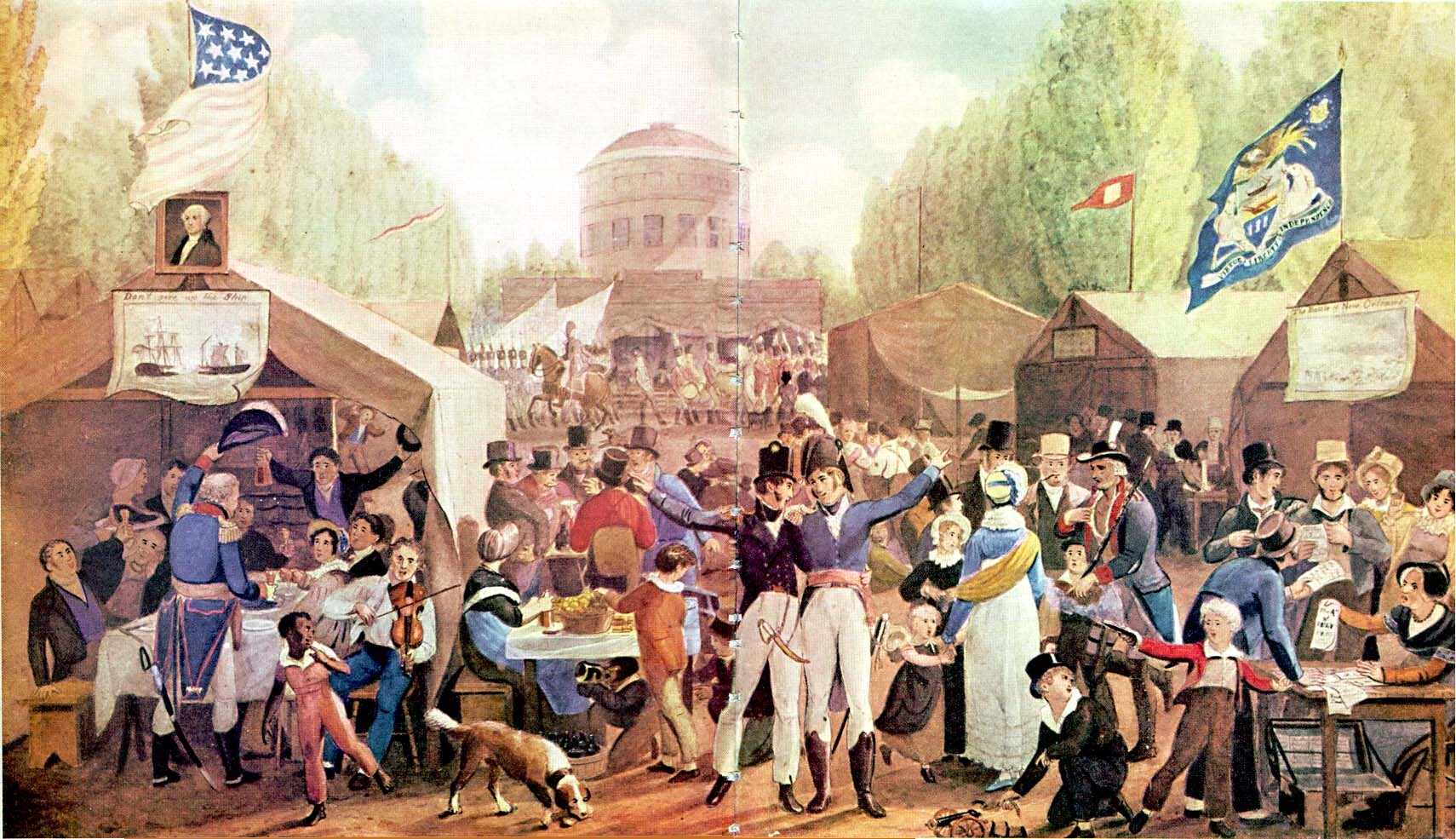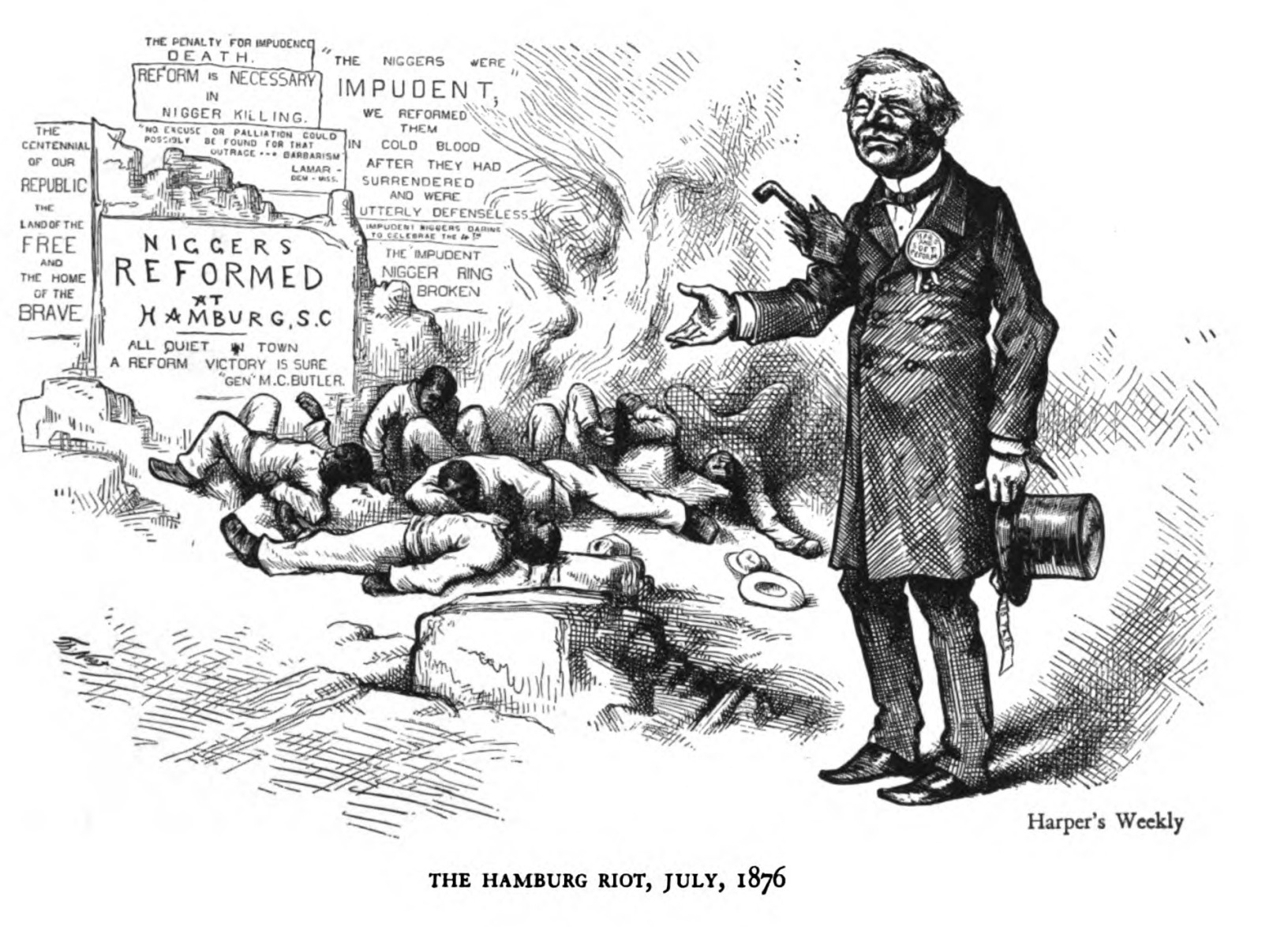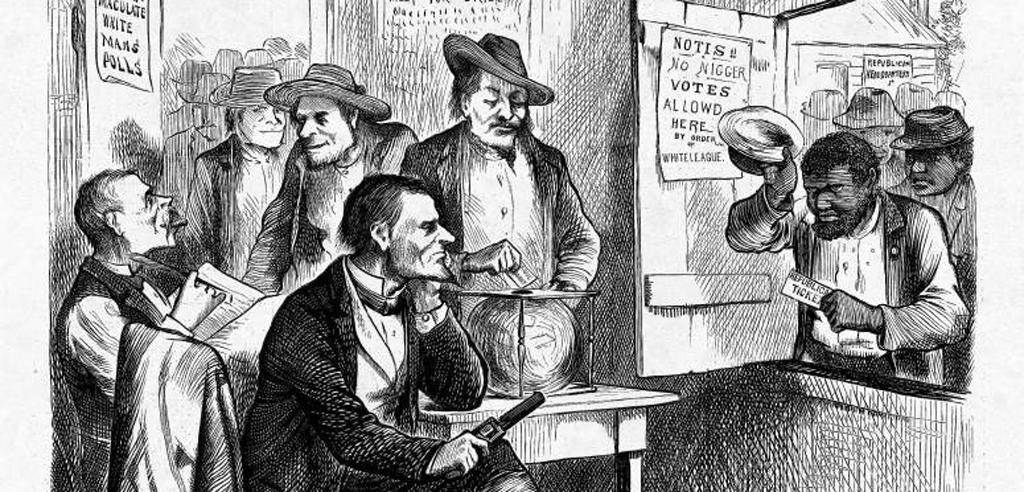
- This event has passed.
What to the African American is Independence Day?
July 4, 2023
July 4, 2023
“Fellow Citizens, I am not wanting in respect for the fathers of this republic. The signers of the Declaration of Independence were brave men. They were great men too-great enough to give fame to a great age. It does not often happen to a nation to raise, at one time, such a number of truly great men. The point from which I am compelled to view them is not, certainly the most favorable; and yet I cannot contemplate their great deeds with less than admiration. They were statesmen, patriots and heroes, and for the good they did, and the principles they contended for, I will unite with you to honor their memory.”
-Frederick Douglass, Oration, Delivered in Corinthian Hall, Rochester, NY, July 5th, 1852.
Dear Friends of Hallie Q. Brown,
History is an important part of our society, providing the foundation for our modern day. It shows where we came from, and how we got here. History provides crucial context for the decisions that are made, the actions that are taken, and very specifically, the lens through which we view our current laws, statues and practices. This is how we connect the dots to this point in time…Critical History Theory, if you will.
One of the largest problems we face with regard to history, is the tendency to solely focus on the “highlights” from a singular perspective. This viewpoint emphasizes these highlights that come from a dominant culture driven lens and disregards or ignores the contextual background that would more accurately qualify those anchored sentiments. In doing so, we inadvertently have fashioned a “CliffsNotes” version of the past, limiting what we can interpret or learn from it. Historically accurate context helps us to further our understanding on why things happened the way they did.

On July 4, 1776, the Declaration of Independence was ratified and publicized and has been widely celebrated as Independence Day in America.
Most people are unaware, however, that America actually became independent two days earlier on July 2, 1776 when the Second Continental Congress passed the Resolution of Independence that had been proposed in June, which led to Thomas Jefferson working on the Declaration in isolation from June 11th-June 28th, so that the public statement could be discussed and amended, after the passing of the resolution.
Most people also don’t recognize not only the hypocrisy but also the violation of the self-same document, wherein a group of white men, declared freedom from tyranny and oppression, while marginalizing women and enslaving and committing atrocities to Africans, on land stolen from Indigenous peoples through deception, entitlement and murder…But hey, at least we get to shoot off fireworks.
Now, I am not dismissing the importance of Independence Day or the celebration of our nation’s founding, quite the contrary. I am adding appropriate and crucial context to it, much the same way that Frederick Douglass did with his speech delivered at Corinthian Hall in Rochester, NY on July 5, 1852 which has come to more commonly known as “What to the Slave is the Fourth of July?”

In his speech, Douglass acknowledges the work of the Founding Fathers and the birth of America, but points out that it is a celebration of, by, and for white people, because his people, African Americans, still languish in Slavery and are not afforded the rights and privileges that the Fourth of July celebrates. That Black people did not have independence, but were still being compelled to participate in the celebration, is at best a “sacrilegious irony” and at worst an “inhuman mockery.” This drives us back to the point that our lens for viewing and celebrating history is a “CliffsNotes” version, and in actuality, a white one at that.
We gather together on the Fourth of July, have parades and picnics, launch fireworks, and celebrate the birth of our country and our independence from and denunciation of tyranny and oppression back in 1776.
And, yet…
it would be another 89 years before the Civil War brought the end of Slavery, and an additional 99 years before the end of Segregation. In the over 400 years since Black people first landed on these shores and the 247 years since the founding of this country, only 59 of those years have been without legalized oppression. And while legally, Segregation has been outlawed, systemic racism still permeates our society, influencing actions and decisions; and America’s history of racism is still being written while you read these words.
Consider that, for a moment.
The brave men who gathered together to form a more perfect union, who stood against tyranny and oppression, cast off their shackles from England and declared themselves free…Would that it were that easy for Black people…

Instead, we had to stand by and watch in Slave shackles and servitude as parades and celebrations of freedom crowded the streets. Imagine the impact of that. Imagine the impact of having to cook the food for the picnics, prepare the wagon for travel, perhaps even dress the Slave owners as they prepared to celebrate freedom on Independence Day…while you remained in bondage.
Imagine further still, being a Free Black person, attempting to celebrate independence and your citizenship only to be attacked by mobs of white people such as the Cincinnati Riots where on August 1, 1841, Black communities held parades to celebrate independence and commemorate the Slavery Abolition Act 1833 and the emancipation of the West Indies, only to experience one of the most violent mob actions in history; or a year later, the Lombard Street riot saw a parade of over 1,000 Black members of the Young Men’s Vigilant Association celebrating independence and commemorating the eighth anniversary of the end of slavery in the West Indies, attacked by a white mob. The victims were the ones arrested while the mob looted, burned and destroyed one of the local Black churches, an abolitionist’s hall and several local homes, alsoon August 1st.
Or how about the Hamburg Massacre, which stemmed from a parade on July 4, 1876, by around 40 members of the local all-Black unit of the state militia to celebrate the centennial of America’s independence. Their initial refusal to let to a two-person buggy plow through the middle of the marchers rather than go around on the 150ft-wide street because the driver said he wouldn’t move to the side “for no damned n*****s,” enraged the white community. This led 200 armed white men from “rifle clubs,” colloquially called the “Red Shirts,” which were white supremacist paramilitary terrorist groups, to show for the hearing. 100 of them attacked about 30 Black servicemen of the National Guard at the armory. Two Black men were killed while escaping that night and four more were tortured and killed later that night in the ensuing chaos. Even though 94 white men were indicted for murder, none were prosecuted.

These atrocities were committed against Black people for holding PARADES!
Parades celebrating freedom, celebrating independence, celebrating patriotism…how much clearer a message is needed to illustrate the perspective that the Fourth of July is truly for white people, not Black, Indigenous or other people of color than for them to be attacked because of celebrating Independence Day?!?!?
Black people actually began celebrating Independence Day on July 5th in order to avoid violence against them.
The Hamburg massacre and like events led straight into the extremely volatile 1876 election campaign and ensuing violence around it, including an estimated 100 Blacks killed during several days in the Ellenton riot. All of this strife and suppression led to the racist Southern Democrats retaking control of the state and passing legislation to impose segregation and “Jim Crow” laws, establish single-party white rule, and disenfranchise Black people with a new state constitution adopted in 1895. These measures prevented the Black community from involvement in the political system and making their voices heard until late 1960s.

Is it beginning to sink in?
The promise of life, liberty and the pursuit of happiness so often synonymous with Independence Day has not only historically left out those of us from marginalized groups, but we have actively been excluded from realizing the true fulfillment of those principles through violence, manipulation and legislation.
And now, today, we face that same threat again. We have elected and appointed leaders who are not only passing legislation and issuing decisions that restrict rights, body autonomy, and opportunity, but are actively celebrating in doing so. How did we go from “We hold these truths to be self-evident…” to reveling in the active oppression of others?
In the last year, the Supreme Court has eliminated the protection of reproductive health and body autonomy, struck down the use of affirmative action in college admissions, struck down student loan forgiveness and affirmed creative businesses’ right to refuse service to the LGBTQ+ community. How do we still claim to be a country of freedom while restricting or eliminating that from our most disenfranchised communities???
Interestingly, in the affirmative action case, Chief Justice John Roberts wrote the majority opinion and did not explicitly say the former precedents were overruled, but Justice Clarence Thomas who wrote an unnecessary concurring opinion and then insisted on reading it aloud, a rarity on the Court, included that those precedents were, “for all intents and purposes, overruled.”
In addition, Roberts wrote in the Opinion that both programs “lack sufficiently focused and measurable objectives warranting the use of race, unavoidably employ race in a negative manner, involve racial stereotyping, and lack meaningful end points.” Thomas, plagiarizing Justice John Marshall Harlan’s dissent from Plessy v. Ferguson in 1896, wrote that the Constitution is “color-blind, and neither knows nor tolerates classes among citizens.” He continued, writing: “…the 14th Amendment declared that the color of a person’s skin should be irrelevant to their treatment under the law, which should be equal to everyone else. The court “must adhere to the promise of equality under the law declared by the Declaration of Independence and codified by the Fourteenth Amendment.”
The operative words here are SHOULD be irrelevant, PROMISE of equality and meaningful END points. The problem that seems to have either escaped the conservative Justices or is being willfully ignored by them, is that regardless of how color blind the Constitution may be, society is not. And if it were simple enough to just apply the “color blind” principles, or establish meaningful end points, we wouldn’t have needed a 14th Amendment to said Constitution to address racism. And how can you establish “meaningful end points” when the depth and breadth of systemic racism is still being determined and by and large America refuses to take responsibility for it?

If the Constitution’s “color blindness” was all that was necessary, we wouldn’t have needed Brown vs. the Board of Education.
If the Constitution’s “color blindness” was all that was necessary, we wouldn’t need the Civil Rights Act of 1964.
And if the Constitution’s “color blindness” was all that was necessary, and meaningful end points could be established, there would be no concept of affirmative action, because the institutions would be fair and impartial in making their decisions, having also removed legacy admissions and taken into account the access to resources and support each student had within their educational experience.
If the Constitution’s “color blindness” were all that were needed, and meaningful end points could be established we would not have the level of marginalization and oppression we have today. We would have solutions.
There would be no inequities to address, because people would have promoted equity themselves. There would be no fabricated cases brought forth to pre-emptively disenfranchise a marginalized community based on sexual orientation. There would be no need for a constitutional right to body autonomy because a chamber full of predominantly white heterosexual males would recognize they have no business telling a woman what she should do with her body, and conservatives would recognize the hypocrisy in ‘fighting for the rights of the unborn” and abandoning all interest in support or success for that child after birth.
America would be fulfilling its promise. But that is not where we are today. Today, we are fighting, once again, for our independence.

Judge A. Leon Higginbotham, Jr. was the commencement speaker when I graduated from Morehouse College. Among all his impressive accomplishments is an “Open Letter to Justice Clarence Thomas from a Federal Judicial Colleague” which he wrote to him upon his appointment to the Court over thirty years ago. In his letter, Judge Higginbotham raises numerous salient points for Justice Thomas and the Court overall, but none more relevant and prophetic than this:
“I am sixty-three years old. In my lifetime I have seen African-Americans denied the right to vote, the opportunities to a proper education, to work, and to live where they choose. I have seen and known racial segregation and discrimination. But I have also seen the decision in Brown rendered. I have seen the first African-American sit on the Supreme Court. And I have seen brave and courageous people, black and white, give their lives for the civil rights cause. My memory of them has always been without bitterness or nostalgia. But today it is sometimes without hope; for I wonder whether their magnificent achievements are in jeopardy. I wonder whether (and how far) the majority of the Supreme Court will continue to retreat from protecting the rights of the poor, women, the disadvantaged, minorities, and the powerless. And if, tragically, a majority of the Court continues to retreat, I wonder whether you, Justice Thomas, an African-American, will be part of that majority.“
It is frustrating, at times, to see the legacy of Thurgood Marshall, John Lewis, Shirley Chisholm, Paul Wellstone, Ruth Bader Ginsberg, Hubert Humphrey, Barack Obama and others be tarnished and set back so blatantly by key members of the three branches of government. Especially during a time when we have been through so much and it is difficult to have hope.
BUT…Douglass also includes a ray of hope for the future in his address:
“I am glad, fellow-citizens, that your nation is so young. Seventy-six years, though a good old age for a man, is but a mere speck in the life of a nation. ‘Three score years and ten is the allotted time for individual men; but nations number their years by thousands. According to this fact, you are, even now only in the beginning of you national career, still lingering in the period of childhood. I repeat, I am glad this is so. There is hope in the thought, and hope is much needed, under the dark clouds which lower above the horizon. The eye of the reformer is met with angry flashes, portending disastrous times; but his heart may well beat lighter at the thought that America is young, and that she is still in the impressible stage of her existence. May he not hope that high lessons of wisdom, of justice and of truth, will yet give direction to her destiny?”
I cannot say what tomorrow will bring, but we are still a young nation. The court may hand down more unfair decisions, Congress and local legislatures may pass more one-sided, inequitable, and bigoted laws, and politicians may place their own self interests ahead of the needs of the populace they have been elected to serve and represent. But that only means that we have to dig in harder, and fight for our Independence again.

I know that we are tired from the past few years. I know that we elected our leaders to represent us and hope to be able to rest while they carry on the work, but that is no longer the case. We cannot sit idly by, and we cannot allow tyranny and oppression to rise again and become commonplace. The price of freedom is high; it always has been. But it is a price we must be willing to pay. And while the numbers may seem overwhelmingly against what is right and just, they are not insurmountable. They never are.
This nation was founded on one principle above all else: that we stand up for what we believe, no matter the odds or the consequences. When those seemingly insurmountable odds are pressing against you, telling you to give up, to capitulate, to compromise, to move out of their way while they strip away freedoms and rights, your job is to plant yourself like a tree beside the River of Truth, and tell them — “No, you move!”
There can be no compromise with truth. There’s no place in a government of the people, by the people, and for the people for graft, or greed, or lies, or compromise with human liberties. We must be a nation of truth, of justice, of integrity, of freedom. We must commit ourselves to ensuring that this country lives up to its principles and lives out the full meaning of its creed of Liberty and Justice for all.
We are still a young nation. We can do this together. We can stand for truth. We can stand for equality. We can stand for justice.
That is what it means to celebrate Freedom.
That is what it means to celebrate America.
This is what it means to celebrate Independence Day!

Sincerely,

Jonathan Palmer
Executive Director

Leave a Reply